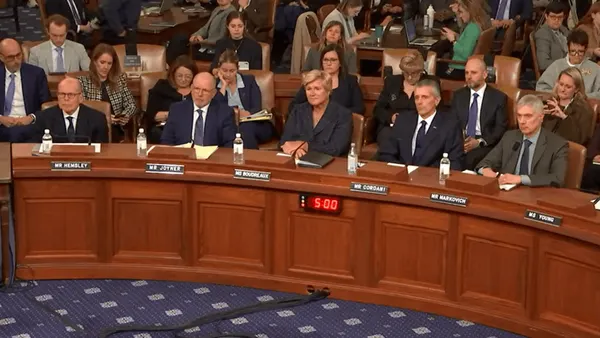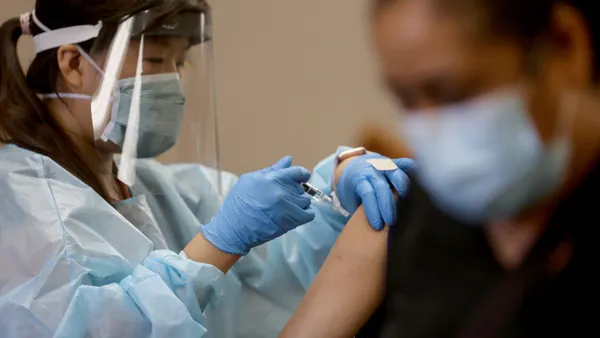Dive Brief:
- Humana on Monday refiled its lawsuit against the federal government for allegedly miscalculating its Medicare Advantage quality scores for 2025, after its previous suit was dismissed on procedural grounds.
- The new suit in a Texas district court is slimmer than its predecessor, focusing on allegations that regulators improperly dinged its plans’ star ratings on the basis of three mishandled customer service phone calls. The original suit made broader arguments about the integrity of the star ratings system and review process.
- Humana also on Tuesday announced plans to reduce roughly one-third of its prior authorizations for outpatient services starting in 2026, as insurers continue to pare back roadblocks to care amid scrutiny of their business practices.
Dive Insight:
Monday’s lawsuit is a last-ditch attempt from Humana to resuscitate its stars, which fell sharply for 2025 — a major problem for the insurer, as the scores are directly linked to valuable bonuses in the program. Humana could lose out on billions of dollars in revenue next year as a result of the drop.
Humana filed its first suit in October, arguing that the CMS acted arbitrarily and capriciously in downgrading its ratings. The suit asked Texas District Judge Reed O’Connor for a speedy ruling so that the payer could factor the revisions into its MA bids for 2026.
But the lawsuit dragged on before O’Connor eventually dismissed the case last week, ruling that Humana had failed to exhaust administrative options before turning to the court. At the time, Humana said it was exploring additional legal action — and since O’Connor dismissed the case without prejudice, that gave the company a window to refile.
Humana’s new lawsuit doesn’t include arguments in its original litigation that accused the CMS of playing fast and loose with cut points (the threshold for reaching each star level) and not allowing the insurer to verify its star ratings calculations.
Instead, it zeroes in on allegations that regulators fumbled ratings for three phone calls meant to test that its customer service centers could answer questions in languages other than English.
According to Humana, a CMS test caller didn’t ask an introductory question as required by regulation for one call. Two other calls were dropped as a result of technical problems, penalizing Humana at no fault of its own, the insurer argues.
The litigation once again asks the Texas Northern District Court to set aside star ratings for contracts impacted by the three calls, and force the CMS to recalculate the scores. It also begs the court for expedited processing, citing the schedule of the bid cycle and that affected plans could be disadvantaged when Medicare beneficiaries shop for coverage in the fall.
“In light of the typical schedule for reviewing and finalizing annual bids, the claims presented here are matters of pressing concern, warranting expedited resolution by the Court,” the insurer’s complaint reads. “Plaintiff Humana is already suffering reputational harms from the inaccurate 2025 Star Ratings, harms that will grow substantially once the Annual Enrollment Period begins on October 15.”
A number of insurers have sued the CMS over their star ratings in recent years with variable results.
In late 2024, the agency recalculated a number of scores after losing litigation that followed a drop in average ratings for 2025 — the number of MA enrollees in 5 star plans, the highest possible ranking, fell from almost 8% in 2024 to below 2% in 2025.
Despite the stars uncertainty — and higher medical spending that’s swamping the managed care sector — Humana reaffirmed its 2025 profit forecast earlier this year. Still, analysts said they’re watching closely for potential earnings erosion as the payer sets up for 2026, a situation that could be exacerbated if Humana loses its latest legal bid to improve its stars.
After O’Connor’s dismissal of the lawsuit last week, TD Cowen analyst Ryan Langston lowered Humana’s earnings per share estimates for 2026.
However, during its June investor day, Humana executives said they submitted MA bids for 2026 assuming they did not win the star ratings suit. If the loss becomes official, Humana expects it won’t achieve the total points required for a four-star rating until the 2028 bonus year.
Humana taking another bite at the star ratings apple coincided with an announcement on Tuesday that the insurer plans to eliminate one-third of prior authorizations for outpatient services like colonoscopies and CT scans.
Humana also committed to sending coverage decisions within one business day for 95% of all complete electronic prior authorization requests, and said it plans to create a national gold card program. Gold card programs exempt certain providers with a track record of submitting valid coverage requests from prior authorization requirements.
Humana’s pledges build on commitments from a raft of major insurers last month to reform their prior authorization policies, including reduce the number of claims subject to prior authorization by next year.
Payers say that prior authorization is necessary to curb spiking healthcare costs and prevent unnecessary medical care. But the utilization management strategy is loathed by providers who say the onerous policies contribute to burnout, slow down the provision of medical care and can lead to worse health outcomes.
Since the killing of UnitedHealthcare CEO Brian Thompson in December, a number of major payers have announced internal changes to their policies that they say will make accessing healthcare easier and more affordable to their members.
Humana reports second quarter results on July 30.














